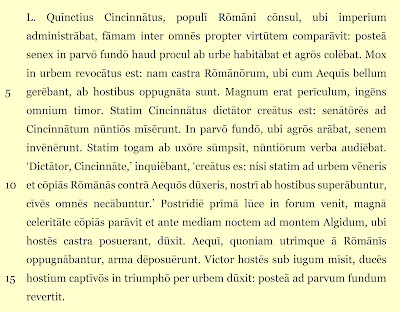L(ūcius). Quīnctius Cincinnātus, populī Rōmānī cōnsul, ubi imperium administrābat, fāmam inter omnēs propter virtūtem comparāvit: posteā senex in parvō fundō haud procul ab urbe habitābat et agrōs colēbat. Mox in urbem revocātus est: nam castra Rōmānōrum, ubi cum Aequīs bellum gerēbant, ab hostibus oppugnāta sunt. Magnum erat perīculum, ingēns omnium timor. Statim Cincinnātus dictātor creātus est: senātōrēs ad Cincinnātum nūntiōs mīsērunt. In parvō fundō, ubi agrōs arābat, senem invēnērunt. Statim togam ab uxōre sūmpsit, nūntiōrum verba audiēbat. ‘Dictātor, Cincinnāte,’ inquiēbant, ‘creātus es: nisi statim ad urbem vēneris et cōpiās Rōmānās contrā Aequōs dūxeris, nostrī ab hostibus superābuntur, cīvēs omnēs necābuntur.’ Postrīdiē prīmā lūce in forum venit, magnā celeritāte cōpiās parāvit et ante mediam noctem ad montem Algidum, ubi hostēs castra posuerant, dūxit. Aequī, quoniam utrimque ā Rōmānīs oppugnābantur, arma dēposuērunt. Victor hostēs sub iugum mīsit, ducēs hostium captīvōs in triumphō per urbem dūxit: posteā ad parvum fundum revertit.
[A]
Comprehension
[1]
Lines 1 – 3 (… colēbat)
- What political role did Cincinnatus hold? (1)
- Why did he have a good reputation? (1)
- What did he do when he retired? (3)
[2]
Lines 3 – 6 (Mox … timor)
Why
was he recalled to Rome? (4)
[3]
Lines 6 – 8 (Statim … audiēbat)
- What position was he given? (1)
- Who went to see Cincinnatus? (2)
- Where did they find him? (1)
- What did Cincinnatus do when he heard them? (2)
[4]
Lines 9 – 11; translate into English (10):
‘Dictātor,
Cincinnāte,’ inquiēbant, ‘creātus es: nisi statim ad urbem vēneris et cōpiās
Rōmānās contrā Aequōs dūxeris, nostrī ab hostibus superābuntur, cīvēs omnēs
necābuntur.’*
[5] Lines 11 – 13 (Postridiē … dūxit)
- When exactly did Cincinnatus reach the Forum? (2)
- How did he prepare the troops? (1)
- When did he lead the troops to the mountain? (1)
- Why did they go there? (1)
[6]
Lines 13 – end (Aequī … revertit)
- Why did the Aequi lay down their arms? (1)
- What was done to (a) the enemy troops and (b) the commanders? (5); note; the higher the mark the more detail required: [Victor hostēs ¦ (i) sub iugum mīsit, ¦ ducēs hostium ¦ (ii) captīvōs ¦ (iii) in triumphō ¦ (iv) per urbem ¦ (v) dūxit]
- What did Cincinnatus do afterwards? (1)
[B]
Background
https://en.wikipedia.org/wiki/Lucius_Quinctius_Cincinnatus
[1]
What was the role of the consul in Rome? How long was the term of
office? Why do you think two consuls were elected?
https://en.wikipedia.org/wiki/Roman_consul
[2]
How does the Roman understanding of the word dictator differ from our
own?
https://en.wikipedia.org/wiki/Dictator
[3]
Cincinnatus is regarded as a model of statesmanship. Why is this account
important in terms of understanding the Roman attitude towards abuse of power?
https://en.wikipedia.org/wiki/Lucius_Quinctius_Cincinnatus
[C]
Find the Latin for the passive verbs:
- you have been made / created (dictator)
- (he) was made / elected / chosen as (dictator)
- (he) was recalled (to the city)
- (The camp) … was attacked
- (they) were being attacked (from all sides)
- (our men) will be conquered
- (all the citizens) will be killed
*“You
have been elected dictator, Cincinnatus,” they said “Unless you immediately
come to the city and lead the troops against the Aequi, our men will be
conquered by the enemy, (and) all the citizens will be killed.”



No comments:
Post a Comment